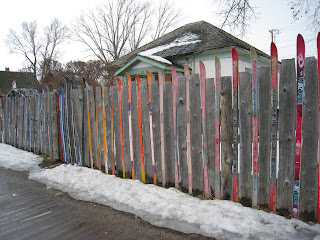12 January 2011
Happy Hour Tonight
Tonight Heritage YP and APA Young Planners Group are having a meet and greet at Tosca Cafe in North Beach from 6:30pm to 8pm. See you there.
11 January 2011
Today in history
On January 11th, 1787, William Herschel discovered two moons orbiting Uranus. He actually discovered the planet itself several years previously. After his death, his son named the two moons after the characters in A Midsummer Night's Dream, Oberon and Titania. Herschel built his own telescopes, including the one pictured that was forty feet long.
04 January 2011
Versailles rehabilitation project
Today NPR featured a short report on a rehabilitation project at the Palace of Versailles, in France. The project involves transforming the Hotel du Grand Controle, where the king's treasurer resided, into a luxury hotel. France is starting to rely more and more heavily on private investors to restore and maintain their national heritage. I am curious to see photos of the project when it is done. This is what it looks like now.
03 January 2011
The One Percent
Soon after I founded my business I signed up to participate in the 1% program. The idea is that if all Architecture firms donated 1% of their time probono then good design would become less of a luxury. This morning I received in the mail a copy of The Power of Probono as a thank for being part of the program. I look forward to reading it.
02 January 2011
Another reason for preservation regulations - Mecca
I can't say I like many of the articles that Nicolai Ouroussoff writes for the New York Times, however his most recent article about development around Mecca is worth reading. Preservation regulations are, perhaps, the most openly disliked of all rules. But look at what happens when those preservation standards are not enforced. Mecca is the most holy location in the Muslim religion and yet the government has allowed enormous towers to be built overlooking the Sacred Mosque. This is an extreme example of what people will do when preservation guidelines are not in place. And while a few people will profit from the towers, an entire community loses. The biggest loss is the pristine views of the hills from the Mosque as Muhammad would have seen them; a direct connection to the spiritual. Ouroussoff, of course, never mentions the benefits of preservation in his article which is where some of the problem lies. It would be nice to assume that architects will always "do the right thing", but that is obviously unrealistic.
01 January 2011
Subscribe to:
Comments (Atom)



